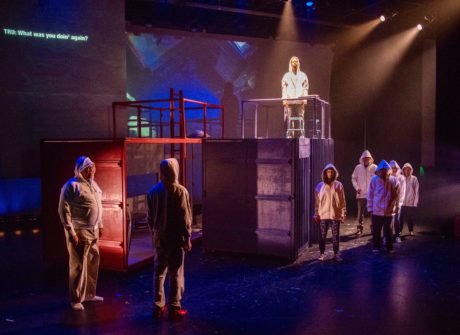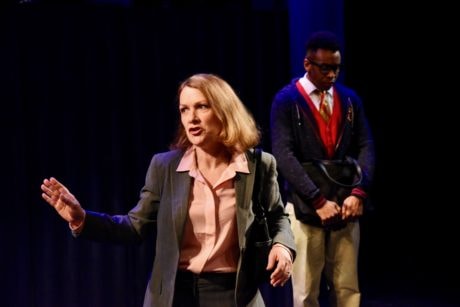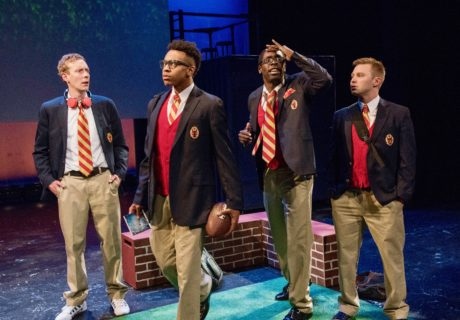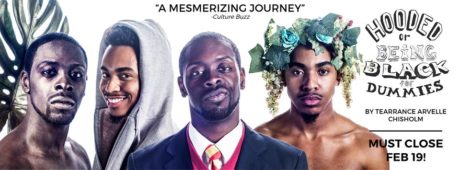There is a laugh track with this show. As in a prerecorded TV sitcom where the studio audience was cued to be amused, there’s an overhead LAUGH sign that flashes intermittently accompanied by canned har-hars and rim shots.

Sometimes the LAUGH sign lights when something is howlingly funny—as happens a lot in this marvelously mischievous new play by Tearrance Arvelle Chisholm, just opened at Mosaic Theater Company. And sometimes the sign lights when something is so not funny we cringe. Because what Chisholm has crafted is a dead-serious comedy so cunning it catches our conscience completely unawares.
The subject of Chisholm’s hilariously subversive script is race relations in America and the peril young black men are in. The story begins in what might seem a cliche: a jail cell where two 14-year-old black men are being held on trumped-up charges (arrested for “bein’ while black”).
We learn that one of them, Marquis, was adopted as an infant by a well-to-do white couple and grew up in this suburb called Achievement Heights with no consciousness of being black. His favorite author is Nietzsche; he doesn’t know who Tupac Shakur is. He’s going to grow up to be a buppie for real. Keith L. Royal Smith, wearing a hoodie over a prep school uniform, captures Marquis’s naivete exactly and endearingly.
The other young man, Tru, comes from Baltimore where he grew up in the projects, and he can quote Tupac chapter and verse. The clothes under his hoodie are nondescript street but he sports ruby-red sneakers. He is both astounded and appalled by Marquis’s cultural ignorance of his roots. Jeremy Keith Hunter nails Tru’s swagger and street smarts with charismatic grit.
Marquis’s mother, Debra, an ultra-lib lawyer, shows up to spring her son from the clink, and in a twist of white guilt gets Tru out too. She invites Tru to come have a sleepover with Marquis so he can have his “first ‘cultural’ friend.” Jennifer Mendenhall’s shrewd performance as Debra makes her earnest do-gooderism a running giggle.

Tru determines to school Marcus in what being black means. As a comedic plot engine this pays off brilliantly, not only because it sets up huge laughs but because it’s a vivid lesson about what being black means for those who’ve not lived it.
Tru writes a handbook for Marquis that’s 114 pages of “wit and wisdom on what it takes to be a young black man in America.” It’s a compilation of crude cracks…
To make sure your point gets across, end all disputes with the phrase “Bitch!”
…
Any and all conversations with the opposite sex are always about your dick.
…and no-joke dope…
Never forget you black. At times you may forget, but remember that they never forget. It’s better to remind yourself, than to have them remind you.
Tru’s truisms play out surprisingly when five of Marquis’s white schoolmates come on the scene, all their 14-year-old urges in bloom. Three are a gaggle of girls—named Prairie, Meadow, and Clementine—who pose incessantly for selfies and compare their crushes on boys. Two are dubious buddies—Hunter and Fielder. The three boys went trespassing one night, but Hunter and Fielder skedaddled leaving behind Marquis to get arrested on his own.
Mendenhall doubling as Prairie and Emma Lou Hébert playing Meadow live up to their characters’ white-sounding names with giddiness and wit. Clementine has shy designs on Marquis, and Madeline Burrows makes her so adorable how could he not fall head over heels for her? Well, because he’s a timid dweeb and lacks mojo, which Tru hilariously provides.
“Hunter and Fielder?” exclaims Tru, dazed by the unbearable whiteness. Josh Adams brings to Fielder a plaintive wimpiness that’s a fine complement to the rowdy raunch of Dylan Morrison Myers’ Hunter. (Myers will later have a solo scene as Hunter trying to follow Tru’s rules for being black that’s a tour-de-farce.)

Observing the action from the sidelines and sometimes playing a part in it is the cop who busted Marquis, Officer Borzoi, a stern and stalwart Frederick Strother. He also does the pre-show speech, which establishes the show’s delightful metatheatricality. (There are, for instance, instant replays of certain scenes during which things turn out slightly different each time.
Set Designer Ethan Sinnott hauls on stage two huge metal containers that look lifted from a ship’s hold. They can be rolled around, at times they open to reveal scene settings inside, as if in a world of flux and concealment that deconstructs before our eyes. Costume Designer Brandee Mathies contributes subtly to the characters’ believability, letting the script not the clothes poke fun at stereotypes. Lighting Designer Brittany Shemuga together with Projections Designers Mimi D’Autremont and Roc Lee sustain visual tension between what could be cartoon and what could be calamity. (The birds’ eye view from an overhead video camera is sometimes projected on upstage screens to unsettling effect.) And besides laying down disconcerting laugh tracks, Sound Designer David Lamont Wilson pumps propulsive percussive rap between scenes.
The playwright in an interview with Dramaturg Otis Cortez Ramsey-Zöe was asked what surprised him about developmental workshops of Hooded. Chisholm answered:
I didn’t know it was a comedy. I think that was my biggest discovery. This play was so personal and so serious in my head that I didn’t really know how funny it actually was.
There were a lot of fine lines to walk with this production—not least because its comic intensity risks giving offense and not seeming serious, whereas the play contains at its core a young black man’s pain. Director Serge Seiden with Associate Director Vaughn Ryan Midder succeed in walking those lines superbly. Mosaic’s world premiere of Hooded, Or Being Black for Dummies is an extraordinary experience—a crackling good comedy that unwraps what’s no laughing matter.
Running Time: Approximately one hour 40 minutes, with no intermission.
Hooded, Or Being Black for Dummies plays through February 19, 2017, at Mosaic Theater Company of DC performing at the Atlas Performing Arts Center – 1333 H Street NE, in Washington, DC. For tickets, call the box office at (202) 399-7993 ext. 2, or purchase them online.





